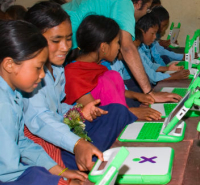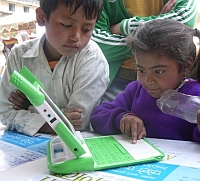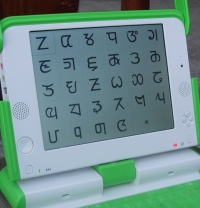Nepal's OLPC deployments are now more than seven months old. I get a lot of questions about deployment issues and solutions. I hope the following information is helpful. First, a snapshot of our deployments:
- Deployments began at Vishwamitra Ganesh and Bashuki public schools on April 23rd, 2008.
- 135 XO-1 laptops deployed to students in classes 2 and 6
- 0 laptops stolen, lost, or otherwise missing. One laptop has been seriously damaged when the child who owned it cleaned it carefully with soap and water. Otherwise no laptops have been seriously damaged as a result of use.
- 8 bad motherboards, 5 bad microphones, and 4 bad keyboards
- Kids use the laptops in the classroom 1-2 periods per week
- Most significant technical issue we have encountered is the "jumpy cursor" problem
- Teachers, parents, and kids are quite happy with the project according to our surveys
In the Beginning: Teacher Training
We conducted four days of teacher training off-site and five days on-site in the classroom with both the students and teachers. A large portion of our teachers had never used a computer before but they learned very quickly. Their enthusiasm was amazing. Training during the off-site sessions formally ended at 5:30 pm but the teachers stayed in our training room each night until 11 pm, pounding away on the XO's and asking endless questions.
While the teachers learned how to use the XO very quickly, I miscalculated how difficult certain actions would be for them. Specifically, it took them a while to learn "dragging and dropping" with the touchpad. Many of the best activities on the XO require serious dexterity with the touchpad such as TurtleArt, Etoys, and Scratch. For this reason we couldn't cover these activities during training. I recommend starting teacher training with activities that do not require a lot of dexterity with the touchpad.
Keeping Kids and Laptops Safe
We were quite worried about the security of the laptops and the safety of the children carrying these expensive machines to and from school everyday. Vishwamitra and Bashuki are both in poor communities. So far our fears have proved unfounded. Not a single XO has been lost, stolen, or otherwise gone missing. I believe this is due to two factors.
- The children and their parents value the XO's and protect them the accordingly.
- Crime in rural Nepal is low relative to other developing countries. In rural communities, everyone knows each other's business.
Laptop Maintenance and Support
One of the great surprises is how little time our team has had to spend on XO maintenance and support. The XO-1 is a fantastic piece of hardware and I am convinced that anyone with a mechanical aptitude can fix 90% of the hardware problems that arise by swapping out the bad component with a good one.
The "test-all" command in the XO's OpenFirmware is an indispensable tool. Just run "test-all" and the firmware will spit out a report indicating if any particular hardware component has failed. Unfortunately, you cannot access the firmware prompt without activating the XO with the developer key. For that reason, we requested developer keys for all of our XO's and disabled the firmware security on each and every one.
We trained select teachers from both schools how to fix software and hardware problems. They can handle most of the hardware-related problems that come up. In my limited experience, it is feasible to train teachers how to fix hardware problems but more difficult to teach them how to fix software problems in the linux kernel or within Sugar. If a serious software problem comes up, our teachers simply reflash the stricken XO with a Nepal-specific software image that includes the standard activities.
Under Pressure: Keeping Up with the Curriculum
In OLPC-land we like to talk about lofty concepts such as constructionism, co-learning, collaboration, etc. Meanwhile, teachers at Bashuki and Vishwamitra have more pressing concerns. The Nepali system does not practice social promotion. Children have to pass year-end examinations to move on to the next grade. Nepali teachers are interested in constructionism, co-learning, and collaboration as long as they don't hinder their students progress through the educational system. Our teachers are quite happy with the E-Paath suite of educational activities that OLE Nepal developed in accordance with the national curriculum. The real attraction of OLPC for teachers is that in class they can task students with a problem on the XO and then spend much of the period working with students that need help.

XO laptops in the Nepali wild
The Missing Piece: The School Server
When we deployed the school server back in April, XS-163 was a very immature server configuration. The XS has come a long way since then under the leadership of XS architect Martin Langhoff. Then and now, the XS does not come with a content filter pre-configured. We had to spend a significant amount of time configuring Dansguardian so that it wouldn't block a lot of good content and still block the bad stuff.
For example, "Dikshit" is a common surname in Nepal. Dansguardian will block access to news articles containing the name because it interprets the last four letters as profanity. The XS is still under heavy development and deployment teams need a significant amount of linux expertise to deploy a fully functional XS.
Top Requests from Teachers and Kids
- Easier way to play music and video
- A better E-Book reader
- A lot more activities for learning English
- All the Nepali textbooks in digital format
- A comprehensive digital library with lots of Nepali-language reading materials
- A Typing Tutor program for learning English and Nepali
- Interactive learning activities that match the Nepali curriculum
- A car racing game (the kids)
We will incorporate the lessons we have learned in these two deployment schools when we expand to 15-20 schools in 5-6 districts in April 2009. Hopefully, I will find more time to write about our experiences over the next several weeks but don't count on it. I have been working on OLPC for more than 2.5 years and I have to say it has absolutely, positively been worth all the trouble.
Postscript: Pradosh Kharel has been working on a comprehensive Deployment Plan for Nepal. Check it out here.
Bryan Berry is the Technology Directory of OLE Nepal and deadbeat co-editor of OLPCNews.com. OLE Nepal is implementing Nepal's OLPC deployments in partnership with Nepal's Department of Education.




Great post Brian. Many thanks.
I translated it in French on the OLPC France blog (http://olpc-france.org/blog/?p=92).
>>>The "test-all" command in the XO's OpenFirmware is an indispensable tool. Just run "test-all" and the firmware will spit out a report indicating if any particular hardware component has failed.
It sounds like enabling the dev key on each laptop (disabling some rainbow/bitfrost stuff) seems to kinda void the point of it all.
I don't have access to my XO, but I feel that the startup diagnostic sounds very similar to this "test-all".. can anyone else comment?
From http://wiki.laptop.org/go/Cheat_codes -
Rocker left: invoke diagnostics. (Starting with Q2D08, you can pause between individual tests by holding down the "rotate" button - the one below the rocker pad.)
> Easier way to play music and video
Maybe we can help through this web site: http://olpc.dailymotion.com ?
"One of the great surprises is how little time our team has had to spend on XO maintenance and support."
Bryan, could you be more specific? There are several people, eg, Jon Camfield, need such numbers to get the correct TCO.
Winter
I would suspect that Bryan's deep knowledge of OLPC & support systems helped reduce support and maintenance efforts.
I'll ask him this afternoon when he comes over to my house (he's in DC at the moment).
@Winter
Wayan is correct that my team's relatively deep knowledge of the XO helped us solve a lot of problems. However, training several teachers how to fix the XO's and liberal use "test-all" significantly reduced the # of problems that even required our attention.
My team probably spends about 5-10 hours/month fixing XO problems that the schools themselves can't fix. That's per 155 XO's in the field.
This # continues to drop slowly but steadily as we get a better handle on problems that show up repeatedly.